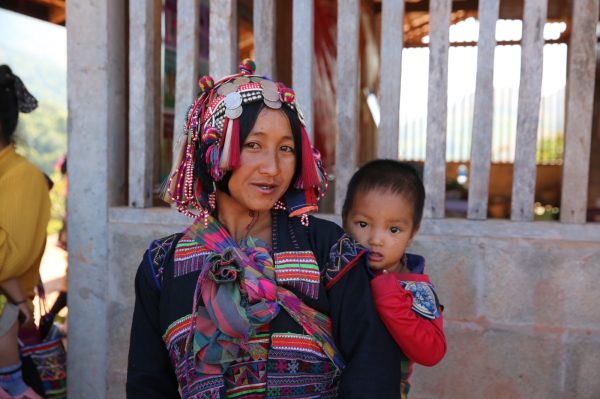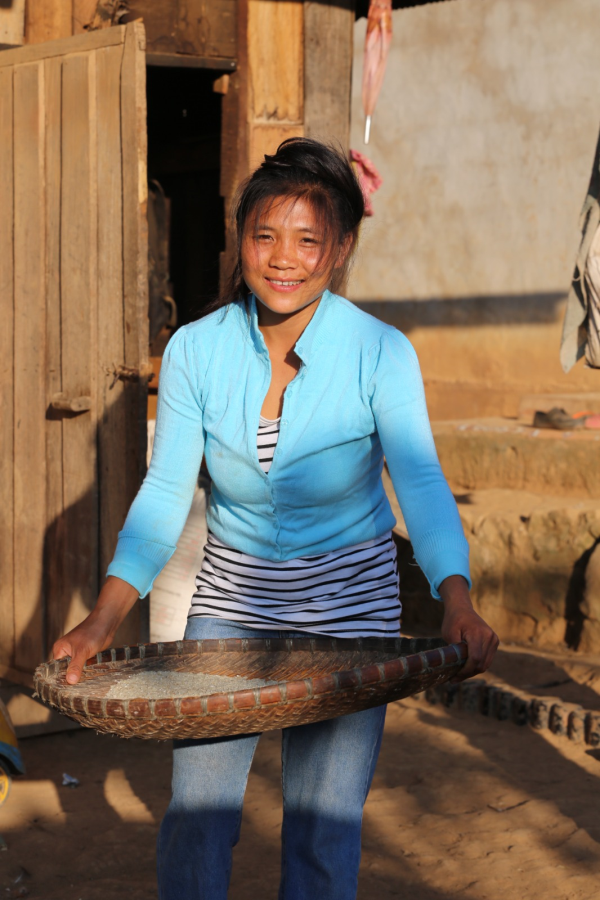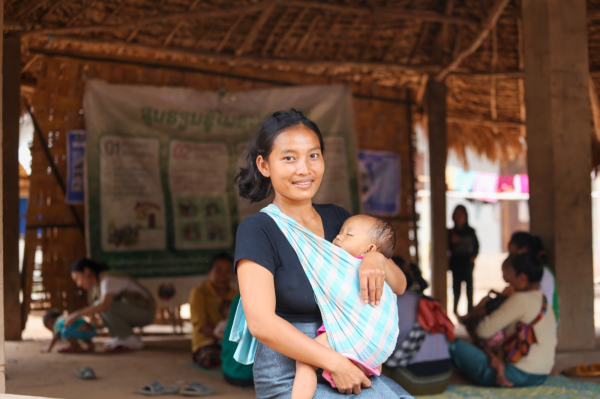KPL
(KPL) People often say "for a plant to grow tall and strong, it needs deep roots." But the truth is, it also needs good soil, water, sunlight, and above all, time. In rural parts of Laos people don't have sufficient healthy and nutritious food to eat. They rely heavily on staple crops such as rice and don't have much knowledge about nutrition. Cultural beliefs also contribute to making it hard for them to eat certain foods, especially in the case of pregnant women. In other words, their life is like a seed being sown in a barren field.

Mi Zhung and her son--Ayo, Akha ethnic at Farmer Nutrition School in Pangsabat Village
Photo by: WFP Laos/Lee Sipaseuth
(KPL) People often say "for a plant to grow tall and strong, it needs deep roots." But the truth is, it also needs good soil, water, sunlight, and above all, time. In rural parts of Laos people don't have sufficient healthy and nutritious food to eat. They rely heavily on staple crops such as rice and don't have much knowledge about nutrition. Cultural beliefs also contribute to making it hard for them to eat certain foods, especially in the case of pregnant women. In other words, their life is like a seed being sown in a barren field.
This situation started to change when the Agriculture for Nutrition project began in 2016. As part of the project, WFP implemented the main nutrition and gender activities, among others through the establishment of Farmer Nutrition Schools at the village level. The project aims to eradicate poverty, improve nutrition through sharing better farming techniques and to empower women and young mothers in rural communities to grow their own food and make healthier choices for their families.
A Farmer Nutrition School is a place where people in the community gather to learn about the importance of nutrition, how to prepare healthy meals, grow their own food, and eat a more varied diet in order to improve their and their children’s health. Moreover, it is a place where women exchange ideas and motivate one another to create lasting change for themselves, their families, and their communities.
Lao women are known for being kind, caring, hardworking and supportive. They are willing to make sacrifices when it comes to their families. Some of these women, with the influence of what they have learned in the Farmer Nutrition School, have started emerging as community leaders. They inspire others to lead healthier lives, improve farming methods and empower themselves in the process. One such woman is Micher, a young woman from the Akha ethnic group who enrolled in the Farmer Nutrition School during her pregnancy. There, she learned how to cultivate her own crops and raise animals such as chickens and ducks. Consequently, her understanding of nutrition deepened significantly. Additionally, her passion for cooking was honed through this project. Now, she takes pride in preparing healthy meals for her family.

“Before this project, I didn’t know much about nutrition. Now, I can prepare healthy meals for my loved ones, especially for my baby. Furthermore, I was able to create my own recipes and share them with my neighbors,” Micher said.
Just as a plant may face obstacles while growing, the project implementation also experienced challenges. In some cultures, pregnant women can only eat chicken or rice together with some salt. In the ethnic cultures of Laos, young babies are usually given sticky rice or leftover water from boiling rice immediately after birth, as a substitute for mother's milk. This is because, after giving birth, most women in rural areas return to their fields within a week and do not have enough time to care for their newborns. These specific traditions and social rules can make it hard for people to change their habits. But without changing these habits, the benefits of the project activities will not materialize.
However, according to Vongsone Oudomsouk, the project’s Field Coordinator, these difficulties can be overcome. "At first, things may seem tough, but if we remain hopeful and persistently strive for the best, it becomes easier over time, just like gardening. If we take care of our garden consistently, the plants will flourish and yield a good taste," he shared. He added that ‘’working closely with local communities and leaders has been instrumental in promoting understanding and acceptance of these changes among community members.’’ As a result, the community members starting to change their habits for the better and are keen on using a long-term solution to fight poverty and malnutrition. They are doing this to improve their children's future.
Xayamphone, a first-time mother, is a great example of this. At first, she was unsure about what to eat when she was pregnant and followed the advice of the elders. But after attending the Farmer Nutrition School, she learned how to take care of her health and prepare nutritious meals for her child and family.

Xayamphone shares her farming expertise and child-caring experiences with fellow community members at the Farmer Nutrition School. Photo: WFP Laos/Lee Sipaseuth
She said: "According to our traditions, after giving birth, we avoid eating pork, beef, fruits, and plants with yellow flowers. But that all changed when I started going to the Farmer Nutrition School. There, I learned how to stay healthy, cook and eat nutritious foods for my family. I also learned how to process things like banana and pumpkin chips, fermented vegetables and meat, so they can be used longer. Sometimes, I share these foods with my neighbors and even sell them at the market nearby to make some money."
Mr. Sisovath Phandouvong, the project’s government coordinator from the Ministry of Agriculture and Forestry said: ‘’Poverty rates have dropped from 70 percent in 2016 to 46 percent in 2022 - this significant decrease has been a major positive outcome of the project. Additionally, there has been a noticeable improvement in the lives of community members. This can be seen from the 94 percent increase in agricultural production and a 79 percent increase in animal raising. Income generated from agricultural production has shot up by 203 percent[1]. Despite the pandemic inhibiting some projects, the community members were determined and committed. They continued to use their knowledge in their daily lives, such as growing their own food and raising animals, which helped them overcome these challenging times successfully.” However, he continued stating that even though the project has achieved much, it is crucial to highlight the persisting issues that need further focus, cooperation and action, namely: reducing the gender inequality gap, food insecurity and deforestation.’’
Deforestation is a real problem. The project has also been working hard to change a common practice in rural areas on this issue: burning forests to obtain land for farming. According to common belief it is the option for growing food. However, teaching the community about the harm this practice causes in the long term is crucial. It contributes to soil erosion and depletion, but can also cause health problems and loss of water sources. Forests are important because they help with the water cycle, create healthy soil, provide homes for animals, and produce oxygen. In the long term, burning forests makes it harder to improve family nutrition because gradually, there will be less and less farm lands available. In addition, burning forests can even lead to disasters such as landslides.
As the project keeps educating and empowering the community, communities are starting to make better decisions, and together, we can work toward a better, healthier future.
Just like a seed that grows into a big and strong tree, knowledge, actions and time can make a big difference. This seed of change can change the lives of people and communities, one household at a time.
KPL